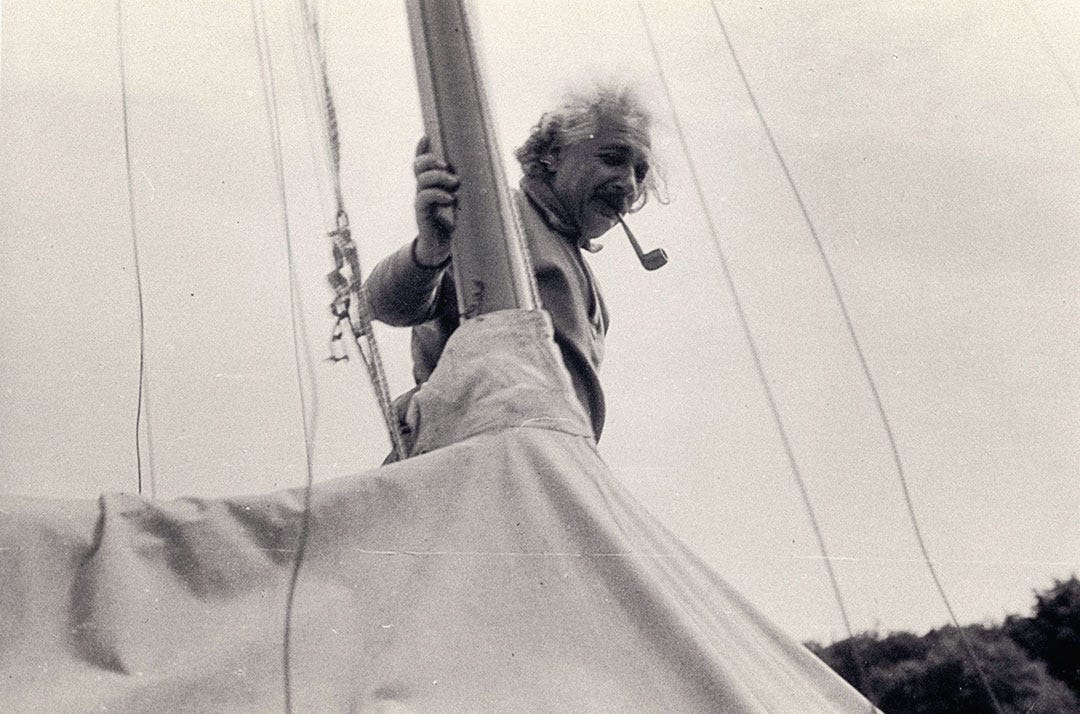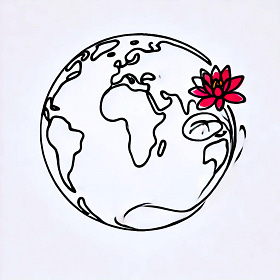Avoid Being Tethered
Limitations, legacy, and the way things have always been done keep you here.
Albert Einstein owned a small wooden boat he called the Tinef - Yiddish for “piece of junk.”
It wasn’t built for speed, or even for sailing far.
It was built to drift.
Albert Einstein the yachtsman.
Source: https://goodoldboat.com/sailor-profile-albert-einstein/
Einstein would spend hours alone at sea, letting himself float aimlessly. To an outsider, it may have looked like inactivity. Yet, it was valuable work - creating the space for ideas to surface, for the mind to roam freely and reorganise what it already knew into something new. A friend once said, “To Einstein, this could simply provide more time to think.”
Today, in a world that is more complex, interconnected, and volatile than many of us have previously experienced, we benefit from the same.
Not more noise. Not more effort.
More space. Space to think bigger. To connect differently. To move smarter.
To see what others miss, and to act before others react.
This is the essence of being Untethered.
Connecting with What’s New
Neuroscientist Dr. Nancy Andreasen, author of The Creating Brain, confirmed in her study what Einstein understood. Periods of deliberate, free-floating thought activate the brain, as opposed to idling it, which we may expect.
During these untethered states, the brain enters REST (Random Episodic Silent Thought), lighting up its most strategic and connected networks. Rather than reacting to the immediate, the brain draws from experience, knowledge, and imagination - connecting ideas, identifying patterns, and assembling new pathways forward.
It makes sense. Yet it is hard to do.
Why We Stay Tethered
Many leaders are tethered - held back by forces that keep their thinking local, their ambitious goals small, and their actions constrained. They don’t lack intelligence, drive, or vision. What they lack is the space - and often the permission - to operate beyond the invisible borders drawn around them.
Across boardrooms, businesses, and even personal choices, familiar forces pull leaders inward.
The corporate immune response means organisations often resist what’s new, bold, or unfamiliar - even when the world demands it. Innovation, ideas, and initiative are welcomed until they threaten the status quo.
Societal norms shape expectations about where we should live, how we should work, and what success should look like - keeping ambition safely within bounds.
Stakeholder expectations, whether from shareholders, clients, managers, or peers, reinforce incrementalism over real ambition. “Don’t rock the boat” becomes the unspoken rule.
And perhaps most critically, inner beliefs - the limiting stories we tell ourselves - narrow what we believe is possible for ourselves, our businesses, our teams, and our reach into the world.
When these forces take hold, they reinforce a small, local, and limited game - even as the world opens up wider than ever. They entrench blind spots and biases, narrowing what leaders notice, prioritise, and pursue.
The risk of staying tethered is increasing. The most significant threats, trends, technologies, and opportunities shaping the future - from climate shifts to AI, from supply chain realignments to new societal movements - increasingly originate far from where we live and work.
Yet most decisions are still made through a local lens, based on narrow inputs and inherited models that no longer match the world as it is - or as it’s becoming.
Making Space
Looking at the news each day, it’s tempting to switch off.
Most of us can’t do that. But being Untethered is about creating space to see clearly, think strategically, and act decisively. It allows you to zoom out, focus in, and move where it matters most. It doesn’t require much time, effort, resource, or permission.
A short note from where I write to you today:
This time last year, my office was in a nice building set off a busy high street, a short tram trip into Melbourne’s CBD. It was a comfortable space, close to cafes and restaurants, with the occasional live band music filtering in from neighbouring The Espy.
Today, my office is a boat.
It’s a deliberate decision to be Untethered.
Not fixed to one location.
Not confined by the patterns and signals that tether most people to the news cycle or routine expectations.
Built for exploration.
Untethered from the status quo, noise, and human-made constructs.
From here, I’m running Untethered: Strategy Workshops on the Water - today from Melbourne, tomorrow from anywhere 🌏.
The (current) office view. Watching untethered tourists.
One recent morning, dolphins swam outside the boat while I was in the marina.
Being Untethered - particularly when getting closer to nature - provides inspiration that the news, the noise, and the narrative of the status quo often can’t.
Welcome visitors: Dolphins on an autumn morning in the marina
There’s value in being Untethered.
It creates the space to see more, to sense more, and to lead in ways that those tethered to the status quo typically cannot.
Over the next month, I’ll be sharing insights on how to get Untethered - and why it matters now more than ever.
We live in a shifting world. The leaders who will shape what’s next are those willing to untether - from limits, from legacy, and from the way things have always been.
If you’re ready to think and act beyond the familiar, I look forward to taking the journey with you.
We go further, faster, together.
Altitude: Zooming Out to Zero In
It takes courage to climb the mast. On a racing yacht at sea, not everyone does it. Many will look up. Fewer will act. And only one will strap in, climb high, and do what needs to be done. They’ll face the force of wind, the motion of the boat, and the pressure of knowing what’s at stake.
From that height, the view shifts. It is about fixing a problem. And, it’s about getting back on course. Making the finish. Making it safely home.
And up there, perspective changes.
Blind to Emergent Possibility
Would Claude Monet’s series on Water Lilies be as impactful if the paintings contained just one lily? What if he preferred the flower yet ignored the water? The paintings would still exist, yet it wouldn’t tell the same story. And if Monet had only painted one element of each masterpiece, would his work have had the same influence in the art world?*






